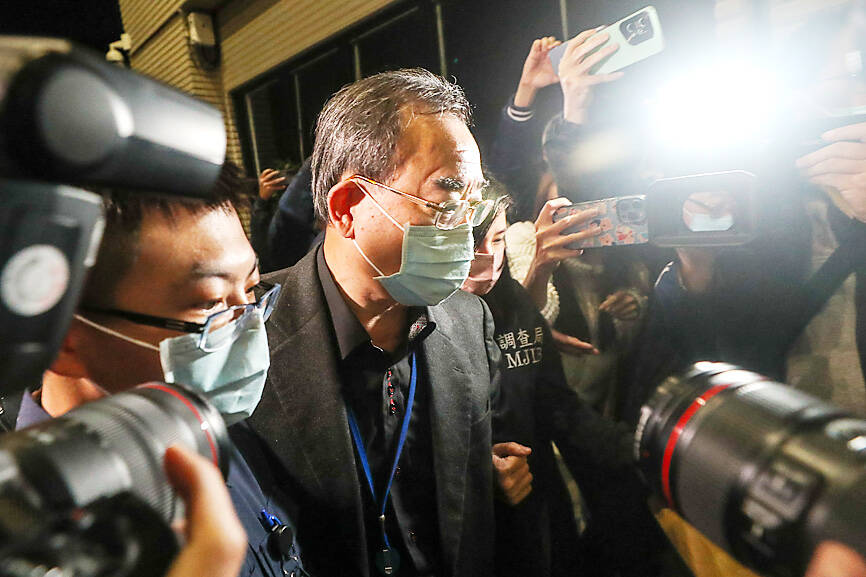Medigen Biotechnology Corp chairman Stanley Chang (張世忠) was released on bail yesterday after being questioned over allegations of insider trading activities involving the company’s COVID-19 vaccine-making subsidiary, Taipei prosecutors said.
Chang and 17 other people were on Thursday taken in for questioning by prosecutors after investigators conducted raids and seized documents at 16 venues, including the Medigen Biotechnology Corp office and the homes of some of the suspects.
Medigen Biotechnology Corp is the parent company of Medigen Vaccine Biologics Corp (MVC), which develops and manufactures the Medigen COVID-19 vaccine, the only domestically made COVID-19 vaccine that received emergency use authorization in Taiwan.

Photo: CNA
The investigation, headed by the Ministry of Justice’s Investigation Bureau and local prosecutors, was originally focused on insider trading allegations against MVC.
However, during that investigation prosecutors were tipped off to look at other practices involving Medigen Biotechnology Corp, including alleged insider trading, irregular trading and financial statement fraud, the Shilin District Prosecutors’ Office said in a statement.
The raids came as prosecutors intensified their probe after finding that corporate insiders passed inside information to relatives or friends to help them make money buying or selling MVC shares from February 2020 to July last year, the bureau said on Thursday.
Chang was released on NT$300,000 bail, while his sister, Chang Tzu-ling (張姿玲), and her husband, Huang Tzu-liang (黃子亮), both members of the parent company’s board of directors, were released on bail of NT$500,000 each, prosecutors said.
Former Medigen Biotechnology Corp chief financial officer Bill Ou (歐朝銓) was released on NT$100,000 bail, prosecutors said.
MVC shares were listed on the over-the-counter market on the Taipei Exchange in April 2018. It started 2020 trading at about NT$19 per share, but skyrocketed to NT$85 per share in mid-July that year as the COVID-19 pandemic took hold around the world.
It fell back to NT$59 the next month and traded at NT$60 to NT$70 for the rest of year.
However, as rumors about its vaccine started to emerge, the stock soared from about NT$72 on Feb. 2 last year to NT$159.59 on Feb. 23, then fell to about NT$115 on Feb. 26 before rising again to NT$211 on April 13.
The stock peaked at NT$280.20 on May 17 last year, tumbled to below NT$130 on June 8 and rebounded again to NT$200 just days later.
The huge price swings, accompanied by seemingly well-timed rumors of whether the vaccine would be approved, led to suspicions of insider trading.

Taiwan has received more than US$70 million in royalties as of the end of last year from developing the F-16V jet as countries worldwide purchase or upgrade to this popular model, government and military officials said on Saturday. Taiwan funded the development of the F-16V jet and ended up the sole investor as other countries withdrew from the program. Now the F-16V is increasingly popular and countries must pay Taiwan a percentage in royalties when they purchase new F-16V aircraft or upgrade older F-16 models. The next five years are expected to be the peak for these royalties, with Taiwan potentially earning

STAY IN YOUR LANE: As the US and Israel attack Iran, the ministry has warned China not to overstep by including Taiwanese citizens in its evacuation orders The Ministry of Foreign Affairs (MOFA) yesterday rebuked a statement by China’s embassy in Israel that it would evacuate Taiwanese holders of Chinese travel documents from Israel amid the latter’s escalating conflict with Iran. Tensions have risen across the Middle East in the wake of US and Israeli airstrikes on Iran beginning Saturday. China subsequently issued an evacuation notice for its citizens. In a news release, the Chinese embassy in Israel said holders of “Taiwan compatriot permits (台胞證)” issued to Taiwanese nationals by Chinese authorities for travel to China — could register for evacuation to Egypt. In Taipei, the ministry yesterday said Taiwan

Taiwan is awaiting official notification from the US regarding the status of the Agreement on Reciprocal Trade (ART) after the US Supreme Court ruled US President Donald Trump's global tariffs unconstitutional. Speaking to reporters before a legislative hearing today, Premier Cho Jung-tai (卓榮泰) said that Taiwan's negotiation team remains focused on ensuring that the bilateral trade deal remains intact despite the legal challenge to Trump's tariff policy. "The US has pledged to notify its trade partners once the subsequent administrative and legal processes are finalized, and that certainly includes Taiwan," Cho said when asked about opposition parties’ doubts that the ART was

If China chose to invade Taiwan tomorrow, it would only have to sever three undersea fiber-optic cable clusters to cause a data blackout, Jason Hsu (許毓仁), a senior fellow at the Hudson Institute and former Chinese Nationalist Party (KMT) legislator, told a US security panel yesterday. In a Taiwan contingency, cable disruption would be one of the earliest preinvasion actions and the signal that escalation had begun, he said, adding that Taiwan’s current cable repair capabilities are insufficient. The US-China Economic and Security Review Commission (USCC) yesterday held a hearing on US-China Competition Under the Sea, with Hsu speaking on